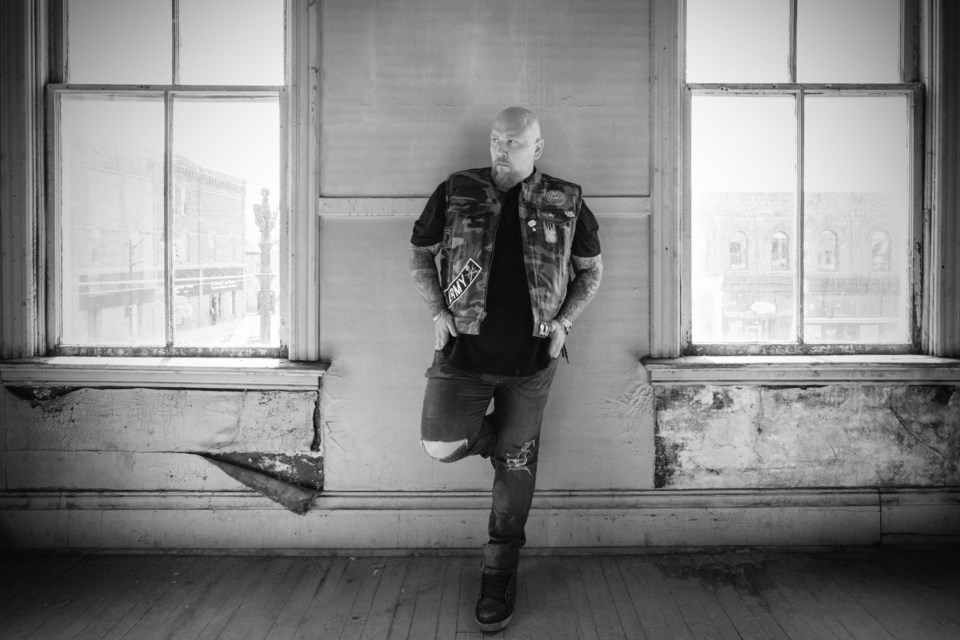It’s often thought that creating music can take one away from one’s troubles by providing a valuable therapeutic outlet.
That’s an adage Tiny based singer-songwriter Graham Trude knows all too well.
Originally from Colllingwood, Trude struggled with the bottle and post-traumatic stress disorder (PTSD) due to some of the things he witnessed and experienced during his time serving with the Canadian Armed Forces and as a northern Ontario policeman.
“I’ve always written music, it’s a really therapeutic resource,” the 35-year-old says during an interview with MidlandToday.
As a former Afghanistan war veteran and police officer, Trude has been channelling decades of often highly traumatic life-altering experiences into truly life-affirming country music, weaving tales of love and loss into memorable melodies in songs such as his newly released single PTSD.
“PTSD was selfishly written about me and my journey, similarly to all my songs,” he says. “If I have only one person listen to it and find some sort of hope, guidance or understanding that they are not alone, I will have succeeded with this release.
“This is not just music to me; this is literal life and death. My everyday therapy in some way involves writing music and staying creative.”
But Trude notes there was a time when he couldn’t see that light at the end of the tunnel and would self-medicate with alcohol to dull the pain.
For his wife Kim, Trude’s personal demons created by PTSD and accompanying alcohol abuse “was nothing short of hell” and created untold stress where she worried about coming home and wondering what she'd find.
“When I saw a Bacardi bottle, I would see some fun,” he says, noting he doesn’t understand why bottles of wine, beer and spirits don’t carry the same warning labels as cigarettes about the potential health dangers.
“I’m not anti-booze, but when you pick up a pack of cigarettes you see picture of a dying woman.”
Trude comes by his love of playing honestly, buying his first instrument, a bass guitar, at a Collingwood secondhand store.
“I figured it was the easiest to learn,” he jokes of his decision at age 12 to buy the four-stringed instrument. “I really wanted to learn how to play Our Lady Peace’s Clumsy.”
He played in bands throughout high school, but wasn’t playing as much in college as his focus turned to drinking and partying.
From there seeking something more disciplined, he enrolled in the military and completed basic training at the Saint-Jean Garrison in Saint-Jean-sur-Richelieu, Québec, before being stationed at CFB Gagetown just outside of Fredericton. He then moved to CFB Edmonton as a member of Lord Strathcona’s Horse (Royal Canadians).
Trude then trained in Germany and Dubai in preparation for Afghanistan in 2009. He then served in the reserves for two years where he got back to playing music seriously.
“With the reserves, I got back to busking and playing bars,” he says, noting he eventually settled on a job as a police officer with the Nishnawbe Aski Police Service, whose officers are spread across an an area that equals two-thirds of the province of Ontario, from the Manitoba border up the James Bay coast over to the Québec border.
“There were fly-in First Nations so a lot of people didn’t speak English.”
Trude eventually transferred to the Orangeville Police Service prior to the Ontario town opting to move from a municipal force to the OPP in 2021.
But his own PTSD came back to haunt him, when he hit rock bottom battling his demons of war.
“I left in 2019 because I was having some big PTSD issues from my military and police work,” he says, adding he eventually ended up going to a trauma and addictions centre in British Columbia for treatment.
“This is something that a lot of people go through. It’s important to learn that you’re not alone.”
But with the support of his family, and lessons learned from treatment, Trude was able to recover and now uses music as his medicine and daily songwriting as his personal therapy.
He's also now embarking on a full-time music career as he gets ready to release his debut EP in the coming months.
“It’s a very unstable occupation, but at the end of the day I’m happy. I’ve always been a songwriter, but before it was strictly for therapeutic purposes.”
Trude eventually became one of the founding members of the Singing Soldiers, a band that partnered with Wounded Warriors Canada to spread awareness of PTSD in veterans and first responders.
He opted to leave that part of his life behind, noting it was “a great expressive and fun thing, but I don’t have to act anymore, I’m just Grant.”
The son of a policeman and a businesswoman, Trude says his influences range from Neil Young and Jason McCoy because “he’s a hometown boy and made it out” to Lynyrd Skynyrd and the Good Brothers.
“The cool thing is that now I get to play music with some of them,” he says, adding he’s excited to get back to playing more live shows now that COVID-19 restrictions have been lifted.
“I did a lot of virtual stuff. Everyone’s so excited right now since we can start booking tours. There are some incredible players all across Ontario.”
For the time being, Trude is working on his next album and the release of his new EP. He also pointes out that he always has his old trusty Washburn guitar around should inspiration strike.
Trude moved to Tiny two years ago with Kim and together, they have a nine-month-old son named Weylen.
“I love the Midland area, it’s our new home.”

.png;w=80;h=120;mode=crop)
